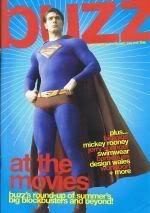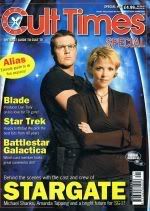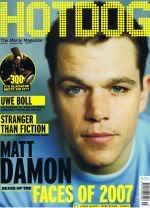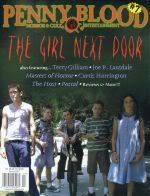Guy N. Smith Interview
There aren't many people who can claim they've created a genre all of their own. But cult 70s horror writer Guy N. Smith is definitely one of those few: his own peculiar brand of pulp novels -- including Night of the Crabs and its sequels, Alligators, Snakes, The Sucking Pit, and many, many more -- shaped the imagination of an entire generation of horror-lovers. More recently, his werewolf novel Blackout won rave reviews and proved Smith still knows what he's doing.
I tracked him down for a chat about the state of the horror genre, offending journalists, and why the countryside is much safer than big, scary London...
It’s a really painfully obvious question, but what was it that got you into horror in the first place?More information about Guy N. Smith can be found on his website. Autographed copies of his books can be ordered via the website through Black Hill Books.
Well, it was available. I mean, I’d got a lot of friends who’ve become full time writers and at that time I was trying to get into Westerns, because Westerns are my big thing. But out of the blue, Laurence James, who was formerly an editor at the New English Library, said they were looking for a werewolf book, and I should send them a synopsis. So I typed up an outline, no sample chapter or anything, and they commissioned it and it went from there.
That sounds very straightforward.
Oh, you’d never get that any more. I used to go down to London in the old days, maybe once a month or so, and I met with the editors and they said “well, what do you want to do?” and I said, oh, a two-book contract, and they said “how’s four?” So I came home on the train with a four-book deal. Those were the days!
Yeah, you were really prolific.
Sometimes I was writing 10 books a year.
Wow.
Yeah, because there were lots of spin-offs, you see. And I did some Disney novelisations, because this chap at NEL mentioned that they were pushing around the Disney books, and I said I’d like to have a go. And they said, well, feel free! So I went down on the train to a little screening room in Soho, watched the film, they gave me the script, I got back on the train, and wrote the book in a week. They said, that’s great. I said I’d like to do another. "Yeah, feel free," they said, "do you want to see the film?" "Well, not really," I said. So they just sent me the script. And then I did a third, and a fourth! Just working from the scripts…
You mentioned travelling to London; you don’t live anywhere near a city any more, and a lot of your books seem to feature people moving from the city to the countryside where nasty things happen to them…
I’ve always lived in the countryside. But nasty things do happen to people who move out into the country… A man’s just bought a tumbledown cottage up the road and there were ambulances up there the other day, he’d chopped three of his fingers off with a buzzsaw.
Ouch.
Yes, I mean, the countryside is not what people imagine. They think it’s this idyllic place to live in, it’s not.
So you’re not keen on lots of people moving out there?
Well, I don’t mind so long as they don’t bring their prejudices and views with them. A lot of them do, I’ll tell you this. They move out of the city and get cottages and then, what they like to do is to worm their way onto the local council. Then their aim is to turn the countryside into the kind of lifestyle they had in the city. I mean that happened recently, not just here, but all over the country.
Was there some real inspiration behind some of your books, then; like Mania, for example?
Well, put it this way, there was a hotel with people who lived there and the couple that owned it were mad as hatters. They really were. And what went on there was incredible. There was one old woman who stayed there and they used to let her sleep under the counter and they’d take her pension book off her!
Does it not ever scare you, living somewhere so isolated?
No, because it’s safe. Here, at night, it’s dark. There’s no street lights, it’s just dark. And I’m quite happy to go out at night because it’s far safer than walking down the street in the city where you might get mugged, stabbed, shot… you know?
Thanks for that!
Hahahahahahaha.
So do you keep up with other horror literature?
I’ve read one or two in the past, but I’ve never really felt the need to read my so-called rivals. Really, I concentrate on what I’m writing. The thing is, I don’t like big books. Not just horror, but any book. Because if you ironed it out, the storyline could be told in 60,000 or 70,000 words rather than 100,000. I’ve always said that what the reader wants is action. See, the horror market changed back in the 80s, when every publisher thought they were going to make a fortune by writing, like, Spiders, and so on but they really saturated the market. I mean, it’s been said that I am a genre on my own but it all changed, and they decided to go for more psychological horror. I remember once I was talking to an editor and he said “can you make it more complicated?” and I said “Complicated? What the hell for?” But there we are.
Do you think that horror literature maybe isn’t so popular any more?
I wouldn’t say that, I mean, this kind of thing is cyclical. As you know, it all fell apart in the late 80s really, it fell apart because basically they could make a lot more money out of something else. But like any genre, it will be back. I mean, my new novel Blackout, that’s doing well in America…
That’s set in America, isn’t it? Was that deliberate, to appeal to the audience over there?
Basically, yeah. You’ve got to look at marketing. A novel set in the States will sell in the States and in the UK. Provided you get the background right, you can get away with it. It’s like with the Westerns, I could write those because I knew the background. My editor at the time said that my great strength is my knowledge of firearms. Which a lot of the Westerns didn’t have. And I could make it really authentic.
Westerns are your great love, but you're known for horror -- what do you want to be writing now?
Well, I’ll tell you this, you know Night of the Crabs had five, six spin-offs? A guy who’s in his 60s read it recently and he said, you know what, it hasn’t aged. It’s unique, it’s got everything in it. Crabs was great fun, it really was. I wouldn’t mind doing a few of what I call 'the oldies.' I mean, I could do now what I did, what was Night of the Crabs, 1976? 30 years ago.
Speaking of Crabs, though, you know that Crabs was filmed? A man was talking to me about making another film of it; he rang me up and said he wants to film it, because, he said, when they made that other Crabs film, you only saw one crab because they had to build one. Nowadays they’d do it with computers. And it’d be cheap.
They'd all be CGI, I guess.
I have a hatred of computers. Well, I am obviously online, but I hate the computer. I haven’t touched a computer for three months now, and my quality of life is better. I’ve taken on a full-time secretary/PA and she is absolutely marvellous, she takes care of everything. She prints out emails for me and I tell her, write this to him and this to him… Most of my early books were written longhand. I mean, I wrote The Slimebeast entirely on Midland Bank’s time. And I did it deliberately, I got a kick out of it. I used to write it on loose-leaf paper, I’d drop it off to this girl on the way home and she’d type it up. I suppose you’re very computer-oriented…
I actually work at a computer magazine, yeah.
So I’ve really put the boot in then! Hahahaha! It’s like somebody rang up -- you know I wrote a book about big cats? Well, I sort of became the big cat expert. Anyway, one of the local papers rang me up to ask if there had been any sightings and I told them no. If anybody comes to me I keep it confidential, they don’t want it to get out. So then I got another phone call from a woman about big cats. And she said, "you said in the paper there hadn’t been any sightings! It isn’t true! I know there have been!" She said, "I think you ought to tell me, it’s very selfish of you." And I said, "Well, that’s the way I work."
And she said, "In the paper they said that you recorded sightings," and I said "Yes, but they shouldn’t have put my contact details in, I asked them not to. And also, you see, whenever you read in the paper about big cat sightings, it means that there isn’t any real news around." She slammed the phone down on me. It turned out she was from the newspaper, the other newspaper, and I’d told her that they only write about big cats when there isn’t any news! But you know, I’m a journalist. I actually find it more demanding than writing fiction.
You never have writer's block?
No. What is writer's block? I’ve read about this writer's block, but I don’t understand it. I really don’t, because I mean I was first published when I was 12, I’ve never had a problem. Nowadays I write from 9 till lunchtime. But I know what I’m going to write, I don’t have writer’s block. What is it? Is it that they can’t find the words, or can’t find the ideas, or what is it? I suppose… I don’t know, do they sit down and don’t write anything or what? Or do they… they don’t feel like it today?










No comments:
Post a Comment